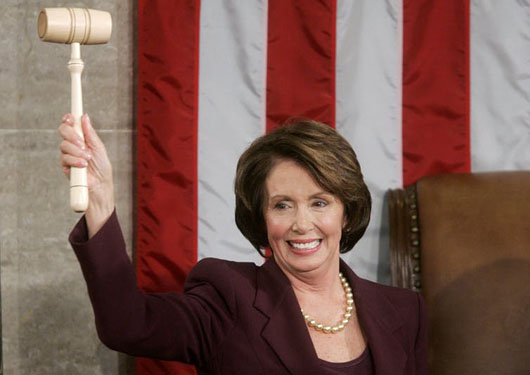by WorldTribune Staff, October 30, 2018
President Donald Trump’s agenda for the next two years will be at stake on Nov. 6 when Americans vote in the 2018 midterm elections.
“The direction of the nation’s most contentious and consequential issues – health care, immigration, taxes, climate change, trade, gun control, ethics and campaign finance overhauls and oversight of the administration – hinges on what voters decide Nov. 6. The stakes are enormous,” Kate Ackley wrote in an Oct. 30 analysis for Roll Call.

If Democrats regain control of the House and deliver the speaker’s gavel to Rep. Nancy Pelosi, they can deny Trump and the GOP of “their legislative wish list, slamming shut the window for a new round of tax cuts,” Ackley wrote.
Democrats will also have subpoena power and will likely begin to investigate “everything from the president’s hidden personal tax returns to the administration’s handling of health care and financial regulations, as well as its response to hurricanes, the Russian election interference investigation and other international crises,” Ackley wrote.
Matt Mackowiak, president of the Potomac Strategy Group says there could be a GOP upside to a House Democratic majority.
“I do believe they move to impeach the president in the first 90 days,” he predicted. That, along with a full slate of investigations, he said, “will help Trump get re-elected.”
The hearings to confirm Supreme Court Justice Brett Kavanaugh gave Americans “a little preview of what life would be like here in the United States Capitol with Democrats in charge, if they’re successful in capturing one or both houses of the Congress after the midterm elections: angry mobs, intimidation, showing up at people’s homes … and trying to intimidate members,” Senate Majority Whip John Cornyn of Texas said. “That’s not exactly my ideal of how the United States Congress should operate.”
What occurs in the wake of next week’s midterms will also hugely impact the 2020 presidential race.
“In many ways, the House Democrats are going to determine in those first 100 days what the common platform of the 2020 presidential candidates will be,” said Rep. Ro Khanna, a California Democrat and member of the Congressional Progressive Caucus. “What we pass on the House side, even if it doesn’t become law, will become the mantra of the presidential candidates.”
If Democrats are able to regain control of the Senate, seen as unlikely, “they could hold up or even block Trump’s judicial and executive branch nominees,” Ackley wrote.
One of the biggest questions, Ackley noted, if Democrats take power in either chamber, remains: “Can they work with a president whom their voters despise, especially when it’s the left’s angry and motivated base that will have helped catapult the party back into power?”
John Feehery, a former congressional Republican leadership aide, who is now a partner at the lobbying shop EFB Advocacy said that “The president is tacking towards the center in everything but his rhetoric. Democrats are tacking further to the left because they don’t like his rhetoric.”
Trump said during an October appearance on Fox News that he believes Republicans will remain in charge of Congress. “And if we’re not, if we lose the majority in the House, which is always a possibility, we will probably just have to fight it out,” he said, adding that there are “a lot of haters” in the Democratic Party.
“Now, can we get along?,” he asked. “Maybe. And there’s a possibility. They want infrastructure, I want infrastructure; there’s something that can bring us together. We have a lot of things where there is commonality and it’s possible that we’ll even get along.”
Subscribe to Geostrategy-Direct __________ Support Free Press Foundation
